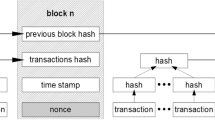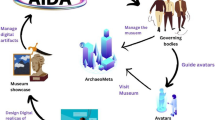Abstract
In today's landscape, numerous factors threaten diverse cultural heritage assets, whether they reside within museums and galleries or as historical landmarks. Current geopolitical challenges such as the COVID-19 pandemic, military conflicts, and food crises contribute to financial instability, reducing efforts to conserve and promote cultural heritage. However, with the emergence of blockchain technology, there is a potential avenue to address this situation. The system proposed in this research targets three key groups: the initial stakeholders, including museums, galleries, local and national authorities, and companies; investors, such as the general public, companies, and NGOs; and visitors. This system facilitates financing for cultural objectives through smart contracts, allowing investors to support curated lists of cultural assets provided by the initial stakeholders. These assets are digitized into unique digital forms and offered to investors during the initial “acquisition” phase. Regular visitors can then use an application to rate these assets during the exploitation phase. Based on these ratings, investors can receive an income proportional to the score given by visitors within the bounds of a portion of the entrance ticket proceeds. Through a case study, we have observed promising results: initial capital can be generated to preserve cultural heritage while investors become advocates for these assets, actively raising awareness. Visitors are incentivized to support what they enjoy, knowing that part of the funds directly benefits the owners, backers, or investors of those specific assets. Moreover, digital assets (e.g. digital twins, XR heritage) can be included within the proposed framework with no additional effort. Future studies will explore methods to reduce system costs, potentially leveraging technologies like Optimistic/ZK Rollups and integrating augmented/virtual reality to enhance this system further.
Access this chapter
Tax calculation will be finalised at checkout
Purchases are for personal use only
Similar content being viewed by others
References
KPMG Fintech Study 2022. https://assets.kpmg/content/dam/kpmg/xx/pdf/2022/02/pulse-of-fintech-h2-21.pdf. Accessed 14 Jun 2022
Duguleană, M., Gîrbacia, F.: Augmented reality meets non-fungible tokens: insights towards preserving property rights. In: 2021 IEEE International Symposium on Mixed and Augmented Reality Adjunct (ISMAR-Adjunct), pp. 359–361. IEEE (2021)
Dutra, A., Tumasjan, A., Welpe, I.M.: Blockchain is changing how media and entertainment companies compete. MIT Sloan Manag. Rev. 60(1), 39–45 (2018)
Tomokazu Matsuyama: Harmless Charm, Sotheby’s Metaverse. https://metaverse.sothebys.com/matsuyama-harmless-charm. Accessed 16 Jun 2022
ERC-20 standard. https://ethereum.org/en/developers/docs/standards/tokens/erc-20/. Accessed 14 Jun 2022
Mouris, D., Tsoutsos, N.G.: NFTs For 3D models: sustaining ownership in Industry 4.0. IEEE Consum. Electron. Mag. (2022)
Rogers, I., Carter, D., Morgan, B., Edgington, A.: Diminishing dreams: the scoping down of the music NFT. M/C J. 25(2) (2022)
Nadini, M., Alessandretti, L., Di Giacinto, F., Martino, M., Aiello, L.M., Baronchelli, A.: Mapping the NFT revolution: market trends, trade networks, and visual features. Sci. Rep. 11(1), 1–11 (2021)
Ertürk, E., Doğan, M., Kadiroğlu, Ü., Karaarslan, E.: NFT based fundraising system for preserving cultural heritage: heirloom. In 2021 6th International Conference on Computer Science and Engineering (UBMK), pp. 699–702. IEEE (2021)
Bolton, S.J., Cora, J.R.: Virtual equivalents of real objects (VEROs): a type of non-fungible token (NFT) that can help fund the 3D digitization of natural history collections. Megataxa 6(2), 93–95 (2021)
Opensea Art collection. https://opensea.io/category/art. Accessed 14 Jun 2022
Quickswap. https://quickswap.exchange/. Accessed 14 Jun 2022
Author information
Authors and Affiliations
Corresponding author
Editor information
Editors and Affiliations
Rights and permissions
Copyright information
© 2024 The Author(s), under exclusive license to Springer Nature Switzerland AG
About this paper
Cite this paper
Duguleana, M., Girbacia, F.S., Duguleana, A.R. (2024). Empowering XR Heritage Through a Blockchain-Based Revenue Sharing System. In: De Paolis, L.T., Arpaia, P., Sacco, M. (eds) Extended Reality. XR Salento 2024. Lecture Notes in Computer Science, vol 15029. Springer, Cham. https://doi.org/10.1007/978-3-031-71710-9_20
Download citation
DOI: https://doi.org/10.1007/978-3-031-71710-9_20
Published:
Publisher Name: Springer, Cham
Print ISBN: 978-3-031-71709-3
Online ISBN: 978-3-031-71710-9
eBook Packages: Computer ScienceComputer Science (R0)





